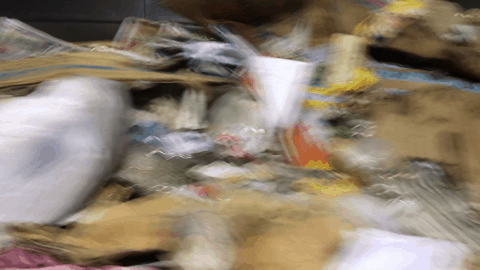Last week I had the pleasure of visiting the Waste Management Material Recovery Facility (MRF) in Minneapolis, colloquially referred to as a “Murf.” Simply put, this is the type of place all of your recycling goes to be processed. This particular facility is where recycling from Columbia Heights goes (and other cities that contract through Waste Management). Fridley’s recycling goes to a similar type of murf facility owned by Republic Services in Inver Grove Heights.

The trip was enlightening and I wish everyone could see it in action. If you can’t make it, here are the cliff’s notes.
Be Lazy
My favorite part of single sort recycling is that you just put all of your stuff in one bin. Remember the days of crushing cans and taking them to the metal recycler? Now you just throw it in the bin.
Not only do you not have to crush your bottles & cans, the recycler prefers you don’t.
This is because the sorting machines rely partly on dimension to determine the material type. It’s easier to sort a plastic bottle that hasn’t been crushed than one that is flat. Vice versa for paper and cardboard, which is the exception to the be lazy rule – you should always break down cardboard boxes so they’re flat.
If you use a brown grocery bag in your kitchen for recyclables, remember to empty the bag when you dump it into the recycling cart for your hauler. It may not get separated at the recycler – which makes it part of the problem, not part of the solution.
Likewise, don’t stuff things into other things. Don’t put a piece of paper in a plastic bottle and think the recycler will be able to sort it out (they won’t). The only time things can be nested is if they are the same product.
Keep It Clean
I want everyone to visit the recycling center because it re-enforces the feedback loop of what you put into your recycling bin. My guess is you don’t talk to the trash guy like your grandma did. Seeing how it’s processed helps close the loop so you know what you should put in and what you shouldn’t.
What you shouldn’t put in is as important as what you should. It matters because recycling is a supply and demand business. The stuff you put in that can’t be processed could very well become a contaminant that devalues the raw material that would normally have a buyer.
As we say in computing, garbage in, garbage out.
The biggest two things I noticed were plastic bags and paper shreds. While these both can be recycled, they need to be handled appropriately.
Plastic bags do not go to your recycling hauler. They need to be brought to a specialist. Target takes plastic bags. Recycle them there. At the Waste Management MRF they remove plastic bags from their equipment 4x daily (along with other trash like saran wrap, ropes, chains, hoses, VHS tapes, cords, and Xmas lights). Some of that other stuff is recyclable as well, but not through your normal recycling hauler.
Paper shreds were everywhere at the murf. They don’t cause trouble as much as they just coat everything and don’t get recycled. You can recycle paper shreds through your hauler, but put them in a brown paper bag and staple it shut and write “SHREDS” on it. Someone at the murf will pull it out, or it’s greater dimension will help it through the process. The murf uses air pressure to sort materials of different density – without being sealed the shreds will likely explode into a ticker tape parade.

Two more things that trouble the recycling plant manager are wood, it gets stuck in the machine and actually starts to burn the sorting wheels up. The other is hazards like lawnmower blades, which will get flung about in a facility like this. 🔪 It will shut the place down. Take it to a metal recycler. Your city or county likely has recycling days where you can bring scrap metal so you don’t even need to seek out a scrap metal specialist.
Stay up to date
Facilities like the murf are constantly being updated to be able to handle new materials. If your hauler, county, or city is doing their job, they’ll send out appropriate information to keep you up to date. However, the Minneapolis MRF highly recommended that you call them if you have a question – 612-379-1360.
Make sure you’re only putting in stuff that your hauler can process. Send as much of the other stuff as you can to the specialized recyclers. What little trash you have left shouldn’t be a huge concern, most of it likely goes to a Energy Recovery Center like the HERC. There it gets burned and turned into energy rather than just adding to the landfill.
Leave a Reply